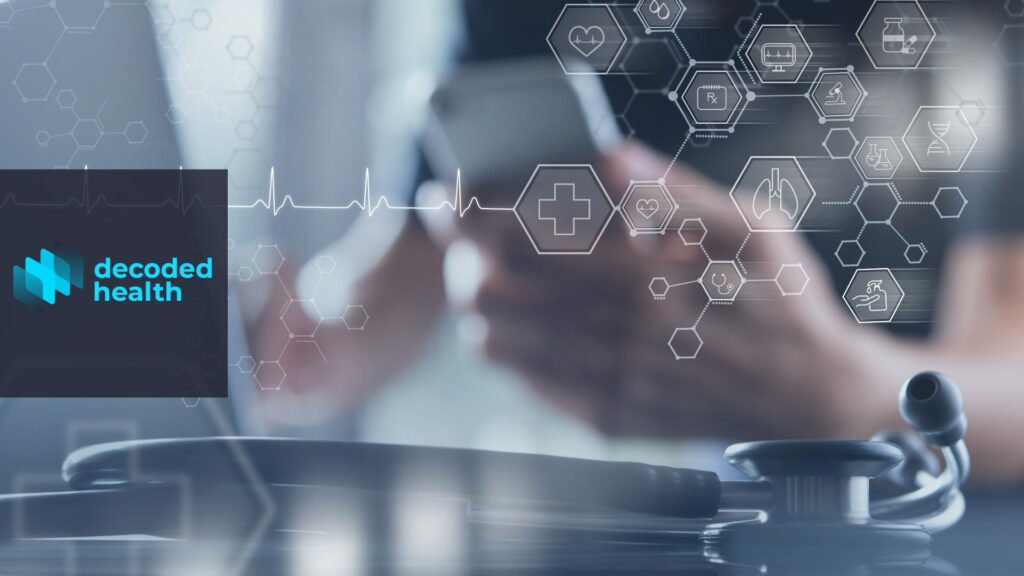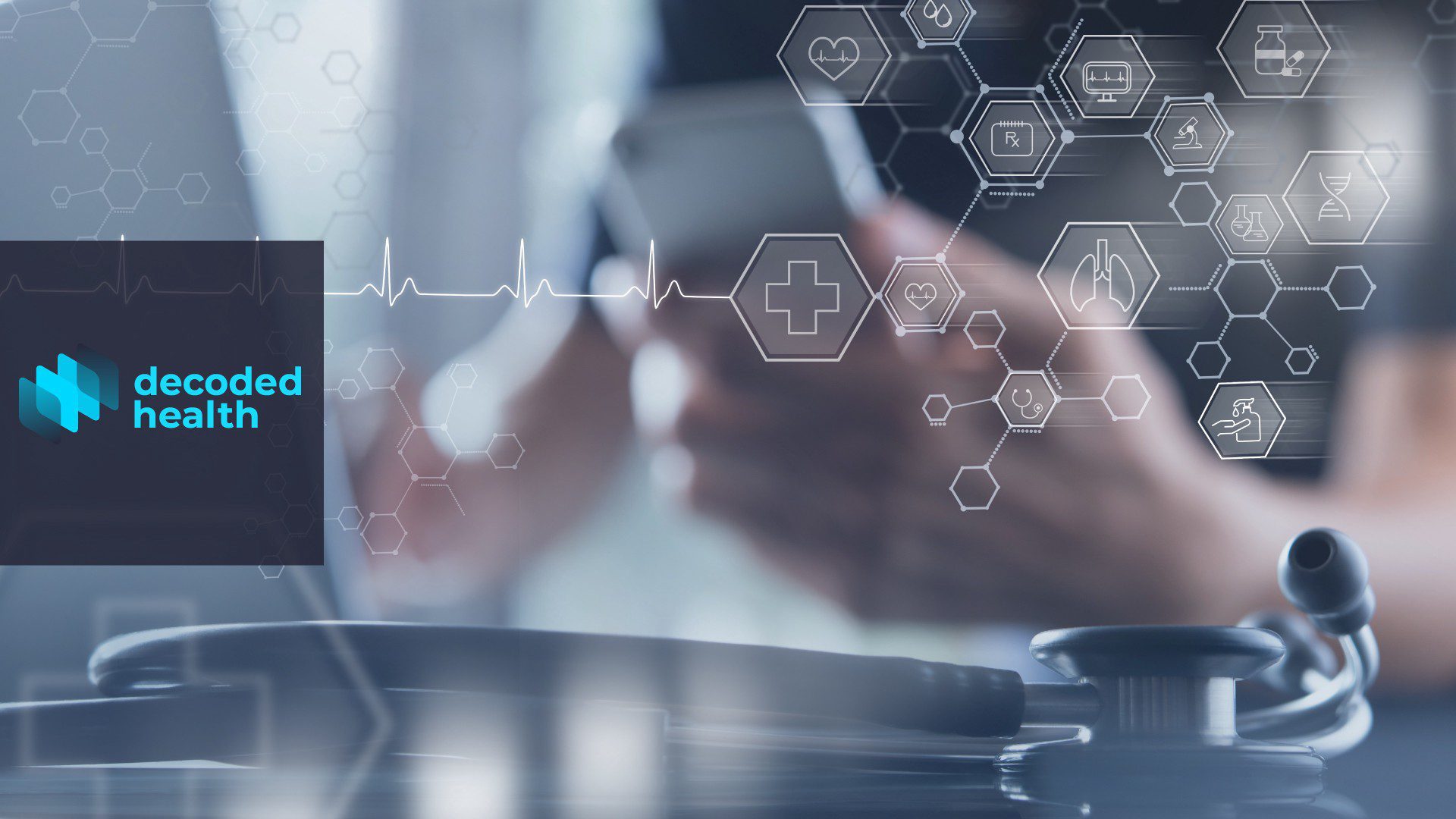
The coronavirus has swept the planet, taking a toll on our health and wealth. The pandemic is hitting every continent and putting strain on our critical infrastructures. Healthcare, under pressure at the best of times, is having to take the brunt of COVID-19.
While coping with the increasing numbers of people seeing diagnosis and treatment of COVID-19, healthcare practitioners must also deal with their normal workload. Coupled with this, new stringent rules on social distancing must be adhered to for the safety of both the physician and the patient.
A visit to a doctor, once a normal event, is now complicated by the practice of social distancing and the threat of infection.
In a world where COVID-19 has taken hold, how can we help our doctors to manage the influx of demand and still provide excellent care for all those who need it?
Decoded Health has the answer to this: The company, a spin-off from SRI International, has launched a new platform that uses several key SRI technologies to provide the world’s first Virtual Medical Resident (VMR).
What is a Virtual Medical Resident (VMR)?
Decoded Health’s Virtual Medical Resident (VMR) is a platform to provide essential support in medical diagnoses to help free up vital time for physicians. Human medical residents typically do much of the initial leg work with a patient as they work under an attending physician. In the normal pre-COVID-19 world, a physician, often a medical resident, would perform a clinical assessment to capture the patient’s medical history and current condition. This information would be reviewed alongside a patient’s medical record to determine differential diagnoses informing which tests are needed to confirm a diagnosis.
This process takes a lot of time…
Decoded Health’s platform provides support to collect and organize patient history and symptoms. Using Artificial Intelligence (AI) and Natural Language Processing (NLP), the VMR can use these key symptoms and patient history to develop a set of questions to help to narrow the diagnosis.
Once the symptoms and history have been used to generate possible diagnoses, the physician can work with the patient more efficiently. By providing this early support, the Decoded Health VMR saves precious physician time, enabling the physician to handle the increased load due to COVID-19.
Decoded Health and COVID-19
The Decoded Health VMR is an important asset in the fight against coronavirus. The symptoms for COVID-19 are similar to pneumonia; the chest pain can also be similar to a heart attack. If a patient can express, in natural language, a description of chest pain it allows the VMR to use inference to more accurately differentiate between diseases and ask better interview questions to the patient. The use of NLP technology, coupled with AI, is a key feature of the VMR. Patients can interact normally with the system, allowing more accurate diagnosis of COVID-19.
Decoded Health provides the first COVID-19 screening using a patient’s natural conversational language. By providing an accurate yet remote diagnosis of COVID-19 symptoms, the VMR helps to maintain social distancing measures, to protect physicians and patients, while freeing up physician time.
Decoded Health: the mother of invention
Decoded Health, a spin-off from SRI International, was designed to provide a solution to the needs of telemedicine before the coronavirus pandemic. Telemedicine is a large and growing market, expected to be worth over $148 billion worldwide, by 2025. However, the coronavirus pandemic, social distancing, and the high transferability of the virus has added a new element to the need for telemedicine.
Decoded Health, through their relationship with SRI International, is able to access some of the world’s most innovative technology. Decoded Health’s VMR uses a combination of SRI technology components, including:
DASL (Deep Adaptive Semantic Logic): Combines explicit knowledge with statistical machine learning to train neural networks.
ARSENAL (Automatic Requirements Specification Extraction from Natural Language): a framework for transforming natural language into logic specifications that can be used for analysis and inference.
When asked about how SenSay will work on the VMR platform alongside DASL and Arsenal, Mark Hanson, CEO of Decoded Health, replied:
“The VMR will also integrate SenSay Analytics technology, which is used to look for emotional clues in spoken language. Medical professionals listen to their patients not only to hear their questions and descriptions of symptoms, but also to assess their state (engaged or passive, energetic or fatigued, etc.), as well as the clarity of their speech, ease of breathing, and other key indicators. SenSay Analytics uses machine learning to find patterns in the patient’s spoken communication that can be associated with these key indicators, adding to the VMR’s data on the patient, and helping the physician to make better informed assessments.”
To date, Electronic Medical Record (EMR) data patterns have been the basis for telemedicine systems. Decoded Health’s VMR goes beyond this by using AI to train a system to develop clinical inference at the level of a resident.
Deep dive into the work of a VMR
A key form of training for human medical residents is the Clinical Practice Guideline (CPG). This is generally a lengthy paper specific to each disease, under a given domain of medicine. A CPG provides guidance on the standard of care and clinical action once a diagnosis is made.
Decoded Health’s VMR uses a combination of AI-based technologies, along with CPG data, to inform the system’s clinical inference. ARSENAL is used to create rule representations from the logic expressed in natural language in the CPG.
The main idea behind DASL is that it unifies rule-based reasoning with machine learning in deep neural networks. The VMR can include any rule sources that describe the knowledge a physician might use and any data relevant to that knowledge.
SRI’s AI technology differentiates Decoded Health from other telehealth platforms. Many AI medical applications are based on formalizing rules from CPG’s, just like Decoded Health does. Unfortunately, this is a manual process and the costs can be prohibitive. Health care is complex and even general guidelines have large numbers of exceptions that all need to be included in the rule base. The differentiator that Decoded Health has is that the DASL platform only requires the general guidelines; it can fill in the details from data gleaned from large databases of electronic health records. This improves the accuracy of the VMR and greatly reduces to cost of its development.
The alignment of technology planets
The Decoded Health Virtual Medical Resident is only possible because of an ‘alignment of technology planets’: SRI International is a community of scientists and engineers that is behind some of the world’s most innovative technologies. Decoded Health’s VMR uses a combination of technologies that were born of DARPA and SRI Spinoffs. The synchronicity of Decoded Health’s VMR with the world’s worst pandemic in 100 years, COVID-19, is not lost on the team. As Mark Hanson explains:
“I cannot believe what we are about to embark on a journey that started in Manish Kothari’s (President of SRI) office. SRI took a big risk and made this happen and it is about to pay off at a time when the world of healthcare most need help. The investment made by SRI will make a major impact on patient lives.”
The Decoded Health difference
Decoded Health uses SRI’s AI tech to give physicians support for their patient-specific analysis and care decisions. It is critical for physicians to be able to understand the basis for the information the Decoded Health platform provides.
Mark Hanson told us that:
“AI applications have traditionally been based on either hand-coded knowledge in the form of rules or data-driven machine learning. Hand-coded knowledge directly leverages what is known about a subject, and results in software that is relatively easy to understand and explain. Machine learning is highly automated and can rapidly find important patterns in data; however, this usually results in software that is difficult to understand and explain. SRI’s AI tech synergistically combines both of these approaches, taking full advantage of existing knowledge and data-driven machine learning; the existing knowledge guides machine learning, and the machine learning extends the existing knowledge. The result is software that can be built and adapted efficiently while maintaining explainability.”
Using the VMR in the Fight Against COVID-19
There is now, and will continue to be, a significant increase in patients calling PCPs to report symptoms of COVID-19. While some automated tools are already available to help patients decide whether to call the doctor, the Decoded Health VMR will greatly reduce the amount of time that a clinician needs to spend with a patient on the phone. The VMR can allow patients to express their conditions in their own words and can summarize the discussion into key patient assertions and automatically link these to key points in the patients’ health history and diagnostic guidelines. This presentation will allow the clinician to drive a brief, focused discussion to verify a diagnosis with a patient. If the VMR is trained on many diseases, then not only is it assessing symptoms against the latest COVID-19 guideline but will automatically look for those factors that distinguish COVID-19 from other diseases.
Decoded Health has entered a collaboration with healthcare partner, Vituity, who provide telehealth for 1.25 million patients in California.
“On the front lines in emergency departments across the nation and serving 6 million patients a year, we see a pressing need to improve access to the right care at the right time,” comments Joshua Tamayo-Sarver, Vice President of Innovation, Vituity. “And despite ever increasing pressures, we see tremendous value in making a human connection to the patients we care for — even when those interactions are brief. We are thrilled to work with Decoded Health. Their deep technology experience and focus on the user experience complement our transformational approach to delivering care. We believe the virtual medical resident is an important breakthrough that will allow physicians and clinicians to provide better, integrated care to more patients.”
As a note about the current COVID-19 pandemic, Mark Hanson stated that:
“In this time of shelter-in-place and social distancing due to the COVID-19 pandemic, telehealth has become a critical part of medical practice. Decoded Health greatly improves the telehealth experience for both patients and doctors, making it possible for an ever-increasing share of healthcare to be effectively performed remotely. This will help the healthcare infrastructure deal with the increased volume of patient interactions, and with the incorporation of information about COVID-19, help physicians to give the appropriate care to all patients, including those who have the greatest need.”



